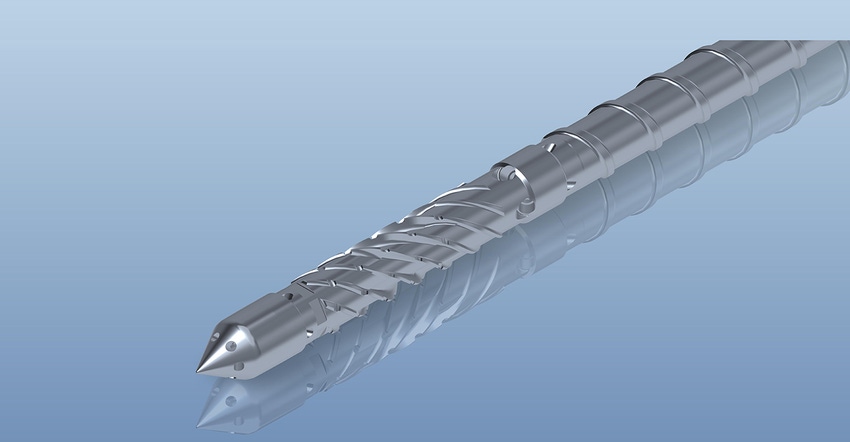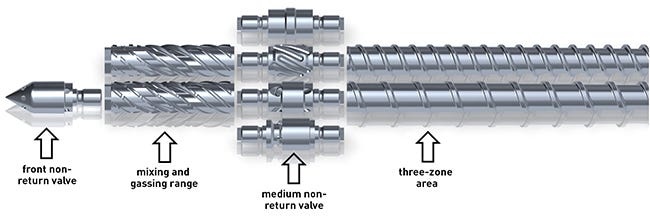Universal MuCell Screw Improves Plastification by 30%
KraussMaffei’s new screw has a modular design to accommodate a range of materials and fillers.
June 13, 2023

KraussMaffei has developed a universal screw for MuCell microcellular foaming injection molding technology. The screw has a modular design that accommodates various materials and fillers and reportedly improves plasticizing performance by 30% compared with other available technologies.
MuCell delivers cost and environmental benefits
MuCell delivers a combination of density reduction and design for functionality, which often results in material and weight savings that can lead to cost reductions and conservation of resources. KraussMaffei sees it as a “technology of the future . . . gaining in importance all the time.” Its new HPS-Physical Foaming universal screw brings flexibility and enhanced performance to the process.
In developing the universal MuCell screw, KraussMaffei said it researched all the screw types currently available and compared their performance in extensive laboratory tests. The company settled on a modular design for its screw, using a bolting mechanism to combine the individual components. In this way, a new screw would not have to be made each time a new material, filler, or fiber is introduced. The design team focused on the screw’s mixing and gas supply (nitrogen or another blowing agent is added to the thermoplastic to produce the foam), the center back-flow barrier, and the three-zone area.
|
Flexibility of the MuCell screw is enabled by a modular design. |
KraussMaffei engineers enlarged the three-zone area with no loss in quality, improving plastification and reducing tooling wear in the process. Previously, larger and more costly screws would be used to ensure complete homogenization of the melt before injecting the gas.
The middle non-return valve (M-RSP) closes at the end of the metering process, separating the mixing and gas supply area from the three-zone section and preventing back flow of the melt. This is the only way to keep the critical pressure above 33.9 bar and, thus, prevent foaming in the plasticizing unit, according to KraussMaffei.
The M-RSP also ensures a constant shot weight. Research showed that a ball check valve was the most effective way to achieve this.
MuCell screw compatible with a range of applications
The KraussMaffei team compared existing screw designs with the newly developed screw by running polypropylene (PP) with different flow indices, mineral fillings, 20% and 30% glass-fiber content, and with ABS and PA6 GF 30. The plasticizing performance varied depending on the compound and set parameters.
KraussMaffei's global MuCell customers work on a variety of applications, and the universal screw had to be compatible, said the company. The three-zone section, therefore, was designed with one thread — for PA6 GF30, two threads would be even better — and the M-RSP with a ball check valve. For high-viscosity materials, a helical shear section is possible.
The in-depth research left KraussMaffei with extensive knowledge that it can apply to the development of screws for specific materials. This could be beneficial to manufacturers who consistently mold the same products over a long period of time. Here, too, the modular concept is helpful for quick tests, said KraussMaffei.
About the Author(s)
You May Also Like





